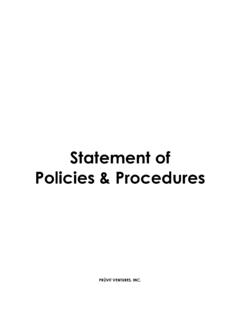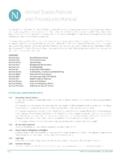Transcription of POLICIES & PROCEDURES - Ability Care
1 Doc. Date: Page 1 of 14 POLICIES & PROCEDURES Ability Care Partners (herein referred to as ACP ) POLICIES and PROCEDURES are intended for the consumer and the employee (herein referred to as PCA or QP ) to be abided by at all times as stated in the PCA Employment Agreement and PCA Consumer Service Agreement on file with ACP. If the consumer or employee does not wish to abide by any changes to this document, they may terminate their services or employment by notifying ACP. 1. SERVICE ORIENTATION Personal Care Attendant services allow consumers with disabilities to live independently in their own home and maintain overall well-being at a greatly reduced cost compared to formal/institutionalized care facilities.
2 Regardless of your PCA or healthcare experience, it is vital that you understand the PCA program and job functions outlined by DHS guidelines and MN Statute (section ) . These guidelines are to be standard and consistent with all PCA employers. PCA Service Terminology & Descriptions PCA Choice Agency - Ability Care Partners (ACP) is a PCA Choice Agency. PCA Choice is designed by the state to be a consumer-directed PCA service model where the recipient of care takes on added responsibility such as hiring/firing, training, scheduling and supervising their PCA staff.
3 Traditional PCA Providers are commonly referred to as a Personal Care Provider Organization (PCPO) where the consumer relies on the PCPO to assign and manage the direct care staff. Consumer - The person with disabilities who is the recipient of personal care services. Responsible Party (RP) - For consumers who are not fully capable of directing their own care and/or making informed decisions, they can elect to have a RP to assist them with directing their cares, making informed decisions and providing co-supervision to the PCAs. When applicable, the PCA and PCA Choice Agency will be required to communicate with the RP, and vice versa.
4 Personal Care Assistant (PCA) - The person hired to provide hands-on, direct care services to the consumer. Qualified Professional (QP) - The QP is a Registered Nurse (RN), Licensed Social Worker (LSW) or Mental Health Professional employed by ACP who conducts in-person visits with the consumer as required by law. Public Health Nurse (PHN) - A Nurse assigned by the County that conducts the annual PCA service assessment to determine the necessity of PCA services for the consumer. Care Plan - Documentation that outlines cares needed, emergency staffing plan and monthly hours plan.
5 The Care Plan is to be developed/maintained by the QP and consumer at each required in-person visit and must reflect the cares determined in the PHN's care assessment. A copy of the Care Plan must be kept on file with the PCA Choice Agency and must be available at all times to the PCA in the consumer's home. Health Care Directive - A written document that informs others of your wishes about your health care. It allows you to name a person ("agent") to make health care decisions for you in the event you are unable to decide. It also allows you to name an agent if you want someone else to make health care decisions for you at all times.
6 You must be at least 18 years old to make a Health Care Directive. Minnesota Department of Human Services (DHS) - DHS regulates the PCA program, conducts audits and has full authority to approve or deny PCA services. Service Agreement (SA) - DHS reviews the PHN care assessment recommendations and issues a SA outlining the dates of service and amount of units (15 minutes) approved for the consumer. Services cannot be provided by ACP without an approved SA. PHN recommended units are subject to change by DHS, the PHN does NOT have final say for the number of units a consumer receives.
7 Consumer's may appeal the DHS decision in writing (directions for appeal are on the consumer copy of the SA). Flexible Use - All SA's are divided into two 6-month periods. If the consumer does not use the approved total hours in the first 6-month period, those accumulated hours do not carry over into the second 6-months. If the consumer goes over the total number of hours in the first 6 months, they are required to wait until the next 6-month period begins to resume using their PCA services. Medical Assistance (MA) - State & Federal Medicaid funds pay for PCA services to the consumer Surveillance Integrity Review Service (SIRS) - A division of DHS that investigates complaints regarding suspected fraud, misuse and abuse of PCA services by the PCA Choice Agency, consumer and/or PCA.
8 Doc. Date: Page 2 of 14 Vulnerable Adult Act - Any person that receives PCA services is considered a Vulnerable Adult, due to their increased risk of vulnerability to abuse, neglect and exploitation. Any suspected, alleged or confirmed violations must be reported immediately to ACP staff. Maltreatment of Minors - Any person under the age of 18 is considered a minor and requires a parent or guardian to make informed decisions for them. Minors are also a protected classification under law. Any suspected, alleged or confirmed violations must be reported immediately to ACP staff.
9 Mandated Reporters - Any person who is employed to provide direct care services to the consumer is required by law to report violations of the Vulnerable Adult Act or Maltreatment of Minors. Anyone found to have violated a consumer's rights or have withheld information related to a violation of a consumer's rights may be punished by fines and prosecution. Common Entry Point (CEP) - Each County in MN has a CEP to answer calls for suspected or confirmed violations of the Vulnerable Adult Act and/or Maltreatment of Minors Act. Reports can be made anonymously. ACP asks all PCAs to notify the agency of your concerns prior to reporting to the CEP (See page 14 for a list of CEP's phone numbers).
10 PCA employee Eligibility & Minimum Requirements - To be employed by ACP as a PCA, you must: Be at least 18 years of age. Effectively communicate with the consumer (or RP), QP and ACP management. Be able to provide PCA services according to the consumer s PCA Care Plan. Respond appropriately to the consumer s needs and report changes in the consumer's condition to them and the QP. Maintain daily written records including, but not limited to, timesheets. Complete training and orientation on the needs of the consumer within the first seven days after services begin.






